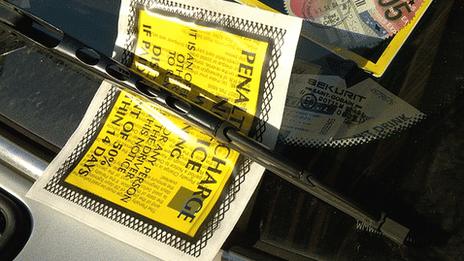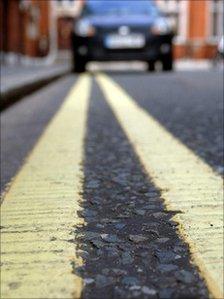How are parking tickets overturned?
- Published
- comments

Most people who get a parking ticket seethe with anger, pay up and get on with life. But thousands of motorists now become amateur sleuths, chronicling confusing "signs and lines" in a battle against the authorities, writes Neil Bennett.
Some people might bracket parking tickets with death and taxes as one of life's inevitabilities.
But what if you parked on double yellows long worn away or missed a sign covered with ivy, or failed to spot the notice 100 yards away suspending your usual parking spot?
Thousands of motorists every year challenge councils over tickets and when those appeals are refused they can end up at the Traffic Penalty Tribunal, the independent body which covers 250 local councils in England and Wales. It is based in Manchester but arranges personal hearings around the country.
A startling 60% of appeals are successful, with many uncontested by councils. But a day spent at the tribunal suggests that it is worthwhile to get out a digital camera and gather evidence the next time you get an unfair ticket.
The Chief Adjudicator for England and Wales, Caroline Sheppard, is a jolly, no-nonsense barrister, who designed the appeal system more than 10 years ago. She seems to understand the daily frustrations of life in the controlled parking zone, and dealing with unbending officials at the town hall.
"The government and local authorities perceive parking as a form of anti-social behaviour," she says. "Councils should be more considerate in the way they deal with people and not adopt a zero-tolerance approach. You do look at some appeals and ask how could the council have rejected that."
So what of the tribunal's approach?
Fiona Allen, 50, head of human resources for a consultancy group, got a parking ticket in a council car park in Milton Keynes. She had paid but the council said she was in the "red zone" and had only paid the rate for the "purple zone". Mrs Allen says that it was impossible to distinguish between the two and produced the photographs to prove it.
"I completely agree," Chief Adjudicator Sheppard told her. "I will instruct Milton Keynes council to cancel the ticket."

Many drivers feel wrongfully ticketed but do nothing
Mrs Allen felt vindicated. "I feel really strongly about this. The ticket was inherently unfair - just a money earner for Milton Keynes. They rely on you giving in and just paying."
It's natural that a solicitor would do their evidential homework. Lawyer Keith Whitehorn, 54, tried to pay for two hours parking outside the county court in Watford. The ticket machine wouldn't accept his coins.
Although he reported the fault immediately and left a message on the council's voicemail offering to pay by other means, a ticket was waiting for him.
The council insisted that when their engineer checked, the machine was working. Mr Whitehorn's research uncovered the council's log which showed that this is the outcome in 25% of cases where the public report faults.
"Councils appear to dismiss every submission," says Mr Whitehorn, "on the slavish principle that unless their engineer finds a fault, then we must be at fault." Appeal allowed.
Ali Shah's case shows the lengths that some motorists will go to to challenge a council. The 38-year-old security manager had travelled with his wife and two-year-old daughter from Ilford in Essex to Northampton to start looking for a new house.
While they went into McDonald's, having paid to park, they got a ticket because they were in a loading bay. The council noted that there was a sign indicating this but admitted that the lines on the road weren't clear.
"They have been wholly unreasonable," the adjudicator tells him. "They should not have troubled you any further. I shall instruct them to cancel the ticket and explain to me why they shouldn't pay for your expenses."
These amounted to a £7.40 travel card and £10 for every letter he had written to the council.
"It does make me really angry," Mr Shah says outside the hearing. "This is the third time I have appealed successfully against parking tickets but I have had to come in here on a day off."
And that is the nub of the issue. Many of the people who appeal against parking tickets are making a principled stand. Even if they win, the cancelling of the ticket will not compensate them for the time and energy they've lost.
But councils are resistant to the notion that they put up Byzantine walls of bureaucracy to stop motorists getting their tickets cancelled.
They point that out of the four million parking tickets issued in Wales in 2008-2009, only 12,500 people complained to the tribunal.
"In more than 99% of cases there is absolutely no evidence to suggest that parking fines have been issued incorrectly," says Councillor Peter Box, chairman of the Local Government Association's Economy and Transport Board.
"The fact that only a tiny minority of fines were appealed against last year proves that, on the whole, parking officers are getting it right. We know parking restrictions are never going to be popular but these restrictions are in place to keep people safe."
But for the ordinary people who have to take a day off to become experts on parking regulations, there's a suspicion that councils could often resolve things earlier.
"We think that not enough local authorities are taking these local challenges seriously," says Jo Abbott, from the RAC Foundation.
"In the back office, these challenges should be dealt with by experienced people who have the discretion to use their common sense."
Additional reporting by Jon Kelly.